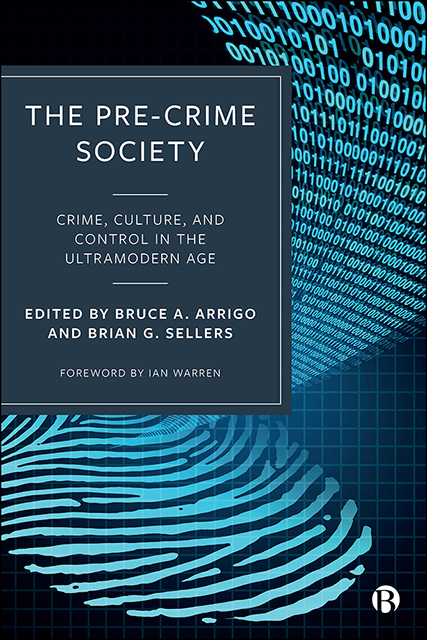Book contents
- Frontmatter
- Dedication
- Contents
- Notes on Contributors
- Foreword
- Introduction: The Ultramodern Age of Criminology, Control Societies and ‘Dividual’ Justice Policy
- Part I Theories, Theorists and Theoretical Perspectives
- Part II Institutions, Organizations and the Surveillance Industrial Complex
- Part III Dataveillance, Governance and Policing Control Societies
- Part IV Systems of Surveillance, Discipline and the New Penology
- Part V Globalizing Surveillance, Human Rights and (In)Security
- Afterword: ‘Pre-Crime’ Technologies and the Myth of Race Neutrality
- Index
Introduction: The Ultramodern Age of Criminology, Control Societies and ‘Dividual’ Justice Policy
Published online by Cambridge University Press: 14 April 2023
- Frontmatter
- Dedication
- Contents
- Notes on Contributors
- Foreword
- Introduction: The Ultramodern Age of Criminology, Control Societies and ‘Dividual’ Justice Policy
- Part I Theories, Theorists and Theoretical Perspectives
- Part II Institutions, Organizations and the Surveillance Industrial Complex
- Part III Dataveillance, Governance and Policing Control Societies
- Part IV Systems of Surveillance, Discipline and the New Penology
- Part V Globalizing Surveillance, Human Rights and (In)Security
- Afterword: ‘Pre-Crime’ Technologies and the Myth of Race Neutrality
- Index
Summary
There are no private lives. This [absence is] a most important aspect of modern life. One of the biggest transformations we have seen in our society is the diminution of the sphere of the private. We must reasonably now all regard the fact that there are no secrets and nothing is private. Everything is public. (Dick, 1956)
It is just when people are all engaged in snooping on themselves and one another that they become anesthetized to the whole process. … As information itself becomes the largest business in the world, data banks know more about individual people than the people do themselves. The more the data banks record about each one of us, the less we exist. (McLuhan, 1970, pp. 12–13)
In the societies of control, on the other hand, what is important is no longer either a signature or a number, but a code: the code is a password, while on the other hand [Foucauldian] disciplinary societies are regulated by watchwords (as much as from the point of view of integration as from that of resistance). The numerical language of control is made of codes that mark access to information, or reject it. We no longer find ourselves dealing with the mass/individual pair. Individuals have become ‘dividuals’, and masses, samples, data, markets, or ‘banks’. … The disciplinary [subject] was a discontinuous producer of energy, but the [subject] of control is undulatory, in orbit, in a continuous network. (Deleuze, 1992, p. 6)
What happens to culture when the experience of privacy, as we have lived it, disappears? What happens to (co)existence when the commercialism of surveillance capitalism fetishizes ‘life mining’ (van Dijck, 2014, p. 198) expressed through the recursive logics of new social media? What happens to human subjectivity when all of reality is reduced to the predictive analytics of dataism (i.e. the algorithmic scrutiny of metadata and the cyber-construction of networked profiles) (e.g. Powell, Stratton & Cameron, 2018)? These are the information technology conditions of the current era. These conditions reflect a collective, undulating consciousness. Within the ‘hardwiring’ or circuitry of this consciousness lurk the passions of law and the emotions of crime reassembled as ‘dividual’ justice (Deleuze, 1992, p. 6). This volume both probes and dissects the criminological landscape of this consciousness that we, and others, have termed the ultramodern (Arrigo, 2012; Arrigo, Sellers & Sostakas, 2020; Shantz, 2014).
- Type
- Chapter
- Information
- The Pre-Crime SocietyCrime, Culture and Control in the Ultramodern Age, pp. 1 - 14Publisher: Bristol University PressPrint publication year: 2021



